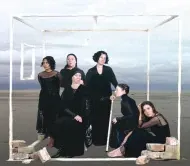Review: The House of Bernarda Alba
Written by

Reviewed by Jodi Yeats
Federico Garcia Lorca completed The House of Bernarda Alba in June 1936, two months before he was executed by Franco’s thugs.
Today’s feminist consciousness means it is to some extent revised to look at female relationships and the place of women in 1930s Spanish villages, and some parts of the world today.
Reviewed by Jodi Yeats
Federico Garcia Lorca completed The House of Bernarda Alba in June 1936, two months before he was executed by Franco’s thugs.
Today’s feminist consciousness means it is to some extent revised to look at female relationships and the place of women in 1930s Spanish villages, and some parts of the world today.
These are concerns of the play, which is all set inside the four walls of the house of the iron-fisted matriarch Bernarda Alba, who virtually imprisons her five daughters and literally locks up her demented mother-in-law.
Bernarda (Michelle Hine) doesn’t allow her daughters to marry because none of the local lads are good enough for her daughters. She is as controlled by her fear of losing face as she is controlling of her daughters.
The sexual frustration the women experience is the fuel that causes their relationships to implode when an eligible man comes on the scene.
Yet the most important and strong parable is of facism, with the play showing that the human spirit cannot be imprisoned. In fact, the stronger the repression of human instincts, not only sexual but the drive to freedom too, the more forceful will be the rebellion. No wonder Lorca got into hot water with the iron fisted Franco!
Nowhere to hide
Not only do the daughters have nowhere to hide from each other, the actors in this version, directed by Margaret-Mary Hollins and produced by Nisha Madhan, are totally exposed to the audience, who sit on all four sides of the stage, as if they are the imprisoning walls.
Bolts of fabric tumble down from the ceiling, as the women sew and embroider away their confined lives.
A chorus, many of who are from adjacent Western Springs College sing and play traditional instruments, or play the parts of unseen villagers, going to harvest or baying for the death of an unmarried mother in an angry mob.
The daughters are fantastically well cast, with each one fitting her character really well. A love-hate relationship between Martiria (Jodie Hillock) and Adela (Nisha Madhan) is particularly well acted. With her bawdy jokes and clear-seeing honesty, the servant Poncia (Sylvia Rands) hold the ensemble together both as a grounding character and a superb actor.
This is a passionate play with strong and universal messages, which is well worth a look. And while you are there, do purchase a programme, which is a work of art in itself.
The House of Bernarda Alba
by Federico Garcia Lorca
A Phundmi Theatre Co. production
Directed by Margaret-Mary Hollins
Produced by Nisha Madhan
Cast: Michelle Hine, Nisha Madhan, Liesha Ward Knox, Tania Anderson, Yvette Parsons, Rashmi Pilapitiya, Jodie Hillock, Sarah Gallagher, Sylvia Rands
On until Saturday, 19 June 2010
Tapac, 100 Motions Road, Western Springs, Auckland
Weds 16 June at 7pm, Thurs 17 June – Sat 19 June at 8pm, and matinee Sat 19 June 2pm
Tickets: $30 full $25.00 concession $20 groups of 8+
Book at Tapac’s website or phone 09 845 0295